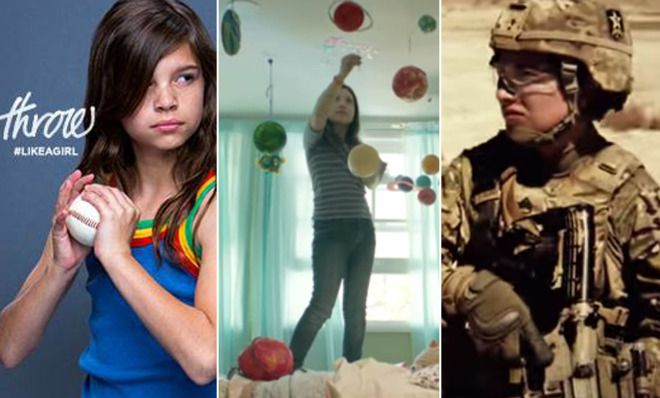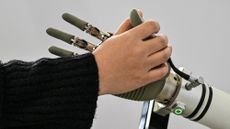Corporate advertisers are hijacking girl power to sell products — and I'm totally into it
Why not use commercials as agents for positive social change?


When I was 11, I played in a softball league. We were called the Blimpies, as in the sandwich shop (such unfortunate sponsorship for tween girls, right?). And let me tell you, I was a terrible softball player.
I was terrified of the ball and would avoid hitting it or catching it at all costs. Fortunately, we Blimpies had the league's best pitcher. Her whip-fast throws — which I blissfully didn't have to face — made us one of the most intimidating teams in the league. Even the adults would marvel at how our star pitcher "didn't throw like a girl."
Actually, she did throw like a girl. She was and is a girl. If anything, she threw like a talented athlete who just so happens to be a girl.
Subscribe to The Week
Escape your echo chamber. Get the facts behind the news, plus analysis from multiple perspectives.

Sign up for The Week's Free Newsletters
From our morning news briefing to a weekly Good News Newsletter, get the best of The Week delivered directly to your inbox.
From our morning news briefing to a weekly Good News Newsletter, get the best of The Week delivered directly to your inbox.
Two decades later, we still haven't slipped the bonds of these maddening "like a girl" stereotypes. Consider the short film below. A woman is told by a director to "run like a girl." The woman's face springs into a wide smile, she extends her arms out straight, her hands flexed outwards like she's drying her manicure, and she clip-clops daintily in place. In the next half-dozen scenes, a collection of adult men and women show off similarly caricatured performances, with the occasional line — "Oh, my hair" — thrown in.
Then we see a tween girl given the same direction: "Run like a girl." She reacts quite differently than the grown-ups. Her face goes serious. Her chin lowers. Her hands form fists. And then she sprints with focus and determination in place as fast as her skinny legs can go.
That's what I call running like a girl.
Believe it or not, this is a tampon commercial, shot by acclaimed documentary director Lauren Greenfield (The Queen of Versailles). Since being posted on YouTube on June 26, this ad has garnered tens of millions of views.
Sign up for Today's Best Articles in your inbox
A free daily email with the biggest news stories of the day – and the best features from TheWeek.com
This ad is brought to us by the feminine hygiene brand Always, one of the many labels of corporate behemoth Procter & Gamble. The video is part of a movement with an accompanying website championing girls' confidence, and a hashtag (#LikeAGirl) that has been tweeted by thousands, including feminist icon Gloria Steinem.
I completely missed the product placement and corporate backing the first time I watched the video. I was too busy imagining the daughter I don't have growing up in our non-gendered household, where the absence of the term "like a girl" empowered her to become our nation's third female president. Then I wiped a tear from my eye, sent the video (and a brief parenting outline) to my husband, and shared the video on social media so that my friends might share my joy.
When I realized it was an Always commercial, I loved it even more. Subtlety probably plays a role here — no one even breathes the words "tampon" or "pad." The only hint of menstruation comes halfway through the ad, with this sentence, "A girl's confidence plummets during puberty," written across the screen. Branding language is very lightly woven in: "Rewrite the rules… always;" "Always #LikeAGirl."
Many critics have not embraced this ad as I have. They blast it as "shamelessly emotionally exploitive." They lament that talented female directors are spending their time selling tampons when they're so underrepresented at the box office.
But you know what? I'll take the girl-power message when I can get it. I want young girls to be encouraged to follow their scientific interests and for female athletes to keep killing it on the field. If mega corporations are willing to back-burner direct sales pitches of their precious products for an emotionally hooked message about these things that I deeply care about, well, I applaud them.
Now of course, you have to remember that Procter & Gamble hasn't straight up abandoned profit-making in favor of good-doing. They're pushing this campaign, at least in part, because they think it will be effective.
"Humans are programmed to respond to emotionally gripping stories," says Erin McNeill, founder of Media Literacy Now, a non-profit focused on media literacy for children. "Emotional stories in ads are not necessarily a problem if the stories are being told to adults who understand that they are being advertised to. It can be harmful if it's exploitive — which advertising to children can be because young children don't understand the profit motive of the storyteller."
But even with that caveat, I just adore this new trend of emotional, girl-power, documentary-style ads. And it really is a trend, one that began with Dove's Real Beauty campaign. Here's one of Dove's earliest successes — a 2006 Super Bowl spot called "Evolution." The time-lapse video showed the painstaking makeup and PhotoShop process that converted a normal-looking woman into a billboardable supermodel.
"Dove was definitely the first one out of the box with this," McNeill says. "But a lot of the other ones are maybe coming out as a demand from many women who are saying, 'We are tired of the sexist, stereotypical advertising.' They're saying, 'You advertisers have a lot of money and the power to change perception and attitude and we demand a change.'"
Last summer, Intel produced "Every girl has the power to change the world," a one-minute commercial that shows women and girls from around the world paired with one-word stereotypes from those regions — "weak," "obedient," "property," — followed by words and scenes representative of the strength girls can find within themselves — "imaginative," "determined," "creative."
Bing celebrated the end of 2013 with a minute-long video featuring clips of heroic women, including Malala Yousafzai, Margaret Thatcher, Boston Marathon survivors, and female soldiers.
Earlier this year, Verizon debuted "Inspire her mind," which illustrates the ways in which a young girl interested in nature and science is subtly deterred from such hands-on creativity and, eventually, the sciences altogether.
These are a far cry from the sexist and derogatory ads that corporations have leaned on for decades. And that is so, so great.
It still, however, is imperfect. As McNeill says, it's great that the story of women and their accomplishments is being told, but this also singles women out as different. "It's the 'girls can do it, too,' problem," McNeill says. "It's accomplishments and women's accomplishments in separate categories. Somehow we have to get to that point where it's everyone's accomplishments are valid on their own."
These ads are also guilty of subtly playing into stereotypes. "[The Intel ad] uses powerful word choice and typography to set up the sexism and gender inequality issue," says Amy Jussel, founder and executive director of Shaping Youth, a medial literacy consortium. "But the negative verbiage and stereotypes are problematic." Just seeing them reinforces them.
And of course, big companies don't always have purely altruistic motives, nor are they free of hypocrisy. Critics didn't have to dig too deep to find the controversy behind Dove's Real Beauty campaign. Dove's parent company, Unilever, also makes Axe Body spray, and those notoriously sexist ads don't do Dove's positive body-image messaging any favors. And Intel, which celebrated heroic women last year? The company has just two women on its 11-person board.
Look, girl-power ads aren't perfect. But they are most definitely progress.
Advertising is inevitable. So why not use these videos, billboards, and glossy ads as agents for change? Let's call out the companies that are trying to make good choices when it comes to the content of their ads (thank you, Always, Nike, Verizon, and Intel), and ask more from those who fall short. As they improve, perhaps I'll buy more of their products. It's a small price to pay for progress.
Lauren Hansen produces The Week’s podcasts and videos and edits the photo blog, Captured. She also manages the production of the magazine's iPad app. A graduate of Kenyon College and Northwestern University, she previously worked at the BBC and Frontline. She knows a thing or two about pretty pictures and cute puppies, both of which she tweets about @mylaurenhansen.
-
 Today's political cartoons - February 22, 2025
Today's political cartoons - February 22, 2025Cartoons Saturday's cartoons - bricking it, I can buy myself flowers, and more
By The Week US Published
-
 5 exclusive cartoons about Trump and Putin negotiating peace
5 exclusive cartoons about Trump and Putin negotiating peaceCartoons Artists take on alternative timelines, missing participants, and more
By The Week US Published
-
 The AI arms race
The AI arms raceTalking Point The fixation on AI-powered economic growth risks drowning out concerns around the technology which have yet to be resolved
By The Week UK Published